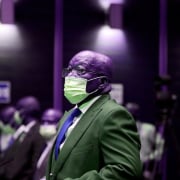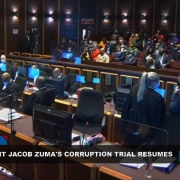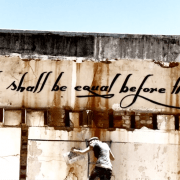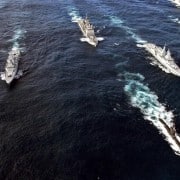|
Getting your Trinity Audio player ready...
|
Browse the mini-site:
What is the arms deal?
What equipment was bought?
When did it all go down?
Who were the people involved?
Allegations of corruption
What is the Seriti Commission?
Useful resources
Updates and analysis
Formally known as the Strategic Defence Package, the arms deal, to use its notorious nickname, was a multi-billion-rand military acquisition project finalised in 1999 by the South African government.
If allegations of large-scale bribery and corruption currently under investigation by a top-level commission are proven true, it will be the biggest corruption scandal in the country’s history, with millions of rands of public money lost to bribery and other irregularities.
The arms deal is also seen as a catalyst for the creation of divisions within the African National Congress (ANC). The first signs of dissent were shown in August 2001 by Andrew Feinstein, a senior ANC MP, who resigned from Parliament when the government moved to curtail a probe into the deal.
“The ANC initially fired Feinstein on 29 January 2001, as the chairperson of the ANC’s parliamentary public accounts committee, because he appealed to government to launch a commission of inquiry into the deal,” said current Cape Town mayor Patricia De Lille in a 2007 speech to foreign media.
Armed with an insider’s view of the process, Feinstein later wrote a book called After the Party.
The massively flawed arms deal is viewed as having set a regrettable tone for government dealings ever since.
“I describe the arms deal and both the corruption in the deal and the efforts to cover up that corruption as being the point at which the ANC lost its moral compass, and I believe that as the years have gone by that contention has only been reinforced,” said Feinstein in a telephonic interview.
“We’ve seen a whole range of corruption scandals after the arms deal and I think that the arms deal and the corruption in it, if they hadn’t got away with it we might have had a very different political trajectory in relation to corruption, so I think the arms deal was absolutely critical in determining the moral fibre, if I can call it that, of the current ANC and government, and that it is the point at which we went badly, badly wrong. I think it’s one of the reasons that corruption has become so pervasive in the ANC and in most levels of government.”
Taxpayers’ money freely spent
The biggest contentious issues associated with the deal are those of corruption, and excessive public spending – two problems which persist today in the government. Questions that have not yet been answered are those of necessity (did the country need all that stuff?), affordability (could we afford to set aside such huge amounts of money?) and transparency (was the procurement process conducted fairly and properly, or was it compromised?).
Many people at the time commented that such expenditure could not be justified. This all happened during the same era of the Aids denialist government of President Thabo Mbeki and its incomprehensible reluctance to provide antiretroviral drugs to millions of HIV-positive South Africans – in the late 1990s health minister Nkosazana Dlamini-Zuma announced that the government could not afford to distribute the life-saving drugs.
So the allocation of millions to the seemingly non-crucial matter of buying new military equipment was heavily criticised by analysts, NGOs and others, and just as heavily defended by the government.
Part of its justification involved the issue of offsets, which were agreements on the part of arms suppliers to invest money in the South African economy in return for their tenders, thus creating jobs and economic growth. In his book The Arms Deal in Your Pocket Paul Holden wrote that on 18 June 1997, deputy defence minister Kasrils said: “There will be substantial offset agreements so that, for instance, South African steel and other local components will be used in production. There will be major offset or counter-trade agreements, so that for every rand spent abroad, the same amount will be invested in South Africa.”
Holden added that offsets “are a particularly controversial way of engaging in trade, and are usually prohibited by the World Trade Organisation, except in relation to developing countries”. In South Africa’s case, they were crucial in swaying the opinions of Parliament, the ministers involved, and the public to believe that the deal would be beneficial.
The offsets didn’t impress many at the time. ” I was representing the Anglican Church at the Defence Review, where we argued that poverty eradication through massive public investment in education, health, housing and job creation was post-apartheid South Africa’s priority, not more weapons for a country that had no conceivable foreign military threat and which was already grossly over-armed relative to neighbouring countries,” wrote activist Terry Crawford-Browne in the 2011 annual report of Ecaar-SA, the Economists Allied for Arms Reduction – South Africa.
His reticence was well-founded – the offsets don’t seem to have had the uplifting effect they promised to. The arm suppliers were penalised only lightly if they didn’t stick to the agreement, wrote Holden, adding that in 2006 Mosioua Lekota revealed that only 13 000 of the promised 65 000 jobs had materialised. The exact extent of the offsets’ failure is hard to measure, he wrote, because they were never properly audited.
According to the evidence team working for the Arms Procurement Commission, which is currently investigating allegations of corruption and mismanagement in the deal, South Africa is still paying the interest on arms and military equipment purchased 14 years ago – and will continue to do so for another four years. Evidence leader Matshego Ramagaga, speaking before the commission, quoted a Treasury affordability study, which estimated that “the finance charges on the capital amount of the Strategic Defence Procurement Packages (SDPP or arms deal) will be settled by 2018″.
Newspaper reports from 2001 say that the interest alone was calculated at around R23-billion.
Why won’t it go away?
Apart from the fact that it has set the standard for levels of corruption in government, the arms deal “is a chapter in our history that needs to be closed, but until the ANC faces up to this and comes clean this will not happen,” said Patricia de Lille.
Archbishop Emeritus Desmond Tutu said that the government’s attempts to tackle corruption can’t be taken seriously or considered genuine until a conclusion is reached by an independent commission. In 2008 he and former president FW de Klerk submitted a joint petition to President Kgalema Motlanthe, asking him to appoint “an independent and public judicial commission of inquiry into the arms deals”. The request was rejected.
Politicsweb owner and founder James Myburgh, writing on his blog ever-fasternews.com in July 2006, said: “What has been missing all along is the thing that would explain the motivation behind the ANC leadership’s strange behaviour. Quite apart from all the irregularities later documented in the process of acquiring the arms, what were they trying to hide when they blocked [Judge Willem] Heath, got rid of [ANC MP Andrew] Feinstein, subordinated Scopa, and persuaded the auditor-general to water down the final [first arms deal] report?”








